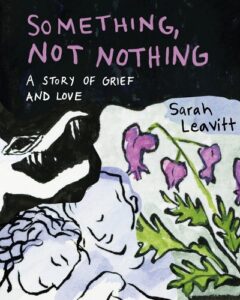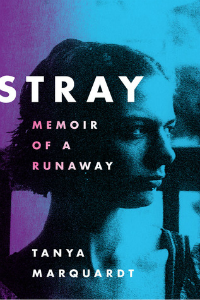Buy this from Bookshop.org to support local bookstores and the Lesbrary!
Something, Not Nothing (September 24, 2024) is a stunning graphic memoir by cartoonist and educator Sarah Leavitt (she/her). In April 2020, Leavitt’s partner of twenty-two years, Donimo, died with medical assistance after years battling chronic pain. After Donimo’s death, Leavitt turned her immense grief and loss into incredible art.
Through impressionistic imagery and poetic prose, Leavitt takes readers through her deeply personal and painful experience of Donimo’s suffering and death. In bleak black and white panels, she explains how Donimo came to make the “terrible and courageous decision” to end her life. As I read, I could feel Leavitt wrangling with the reality of Donimo’s “grievous and irremediable medical condition”—Canada’s criteria for someone to be eligible for medical assistance in dying. I could see her struggling to witness the love of her life in pain, but also terrified to let her go. My heart ached as I imagined her standing alongside the rushing river where Donimo took her last breaths and wondering how she could possibly go on.
But Leavitt’s story did not end there.
Something, Not Nothing traverses the unpredictable terrain of Leavitt’s profound grief after Donimo’s death, but also her tremendous resilience. Leavitt’s transformative journey is palpable, brought to life by her brilliant use of color and vignettes, which give readers a glimpse into her and Donimo’s beautiful relationship. Her memoir demonstrates that grief is non-linear. In one frame, she is reminiscing about the night she and Donimo first met. In the next, she is angry at Donimo for letting her fall in love with her and then leaving her. It is raw and devastating, heart-wrenching and hopeful, all at the same time.
This memoir is a treasure worth your time and your tears. I am no art aficionada, but Leavitt’s work made me feel something. I was blown away by her generosity of spirit in sharing the tenderest parts of her life and her love with the world. Something, Not Nothing is truly a gift.
Leavitt lives in Vancouver, BC. She is an assistant professor in the School of Creative Writing at the University of British Columbia in Vancouver, where she has developed and taught undergraduate and graduate comics classes since 2012. While you wait for Something, Not Nothing to come out this fall, check out her other graphic memoir Tangles: A Story About Alzheimer’s, My Mother, and Me. You can also find Leavitt on Instagram at @sarah_leav.
Trigger warnings for chronic pain, medically assisted death, loss of a loved one, and grief.
Raquel R. Rivera (she/her/ella) is a Latina lawyer and lady lover from New Jersey. She is in a lifelong love affair with books and earned countless free personal pan pizzas from the Pizza Hut BOOK IT! program as a kid to prove it.


